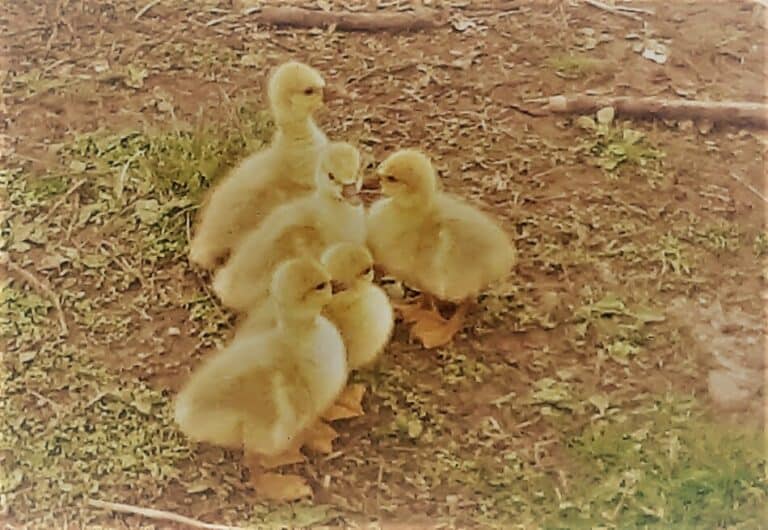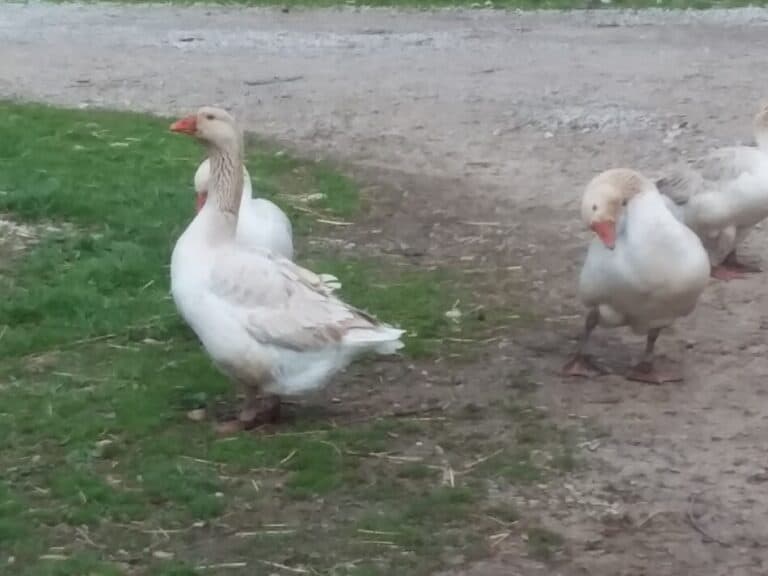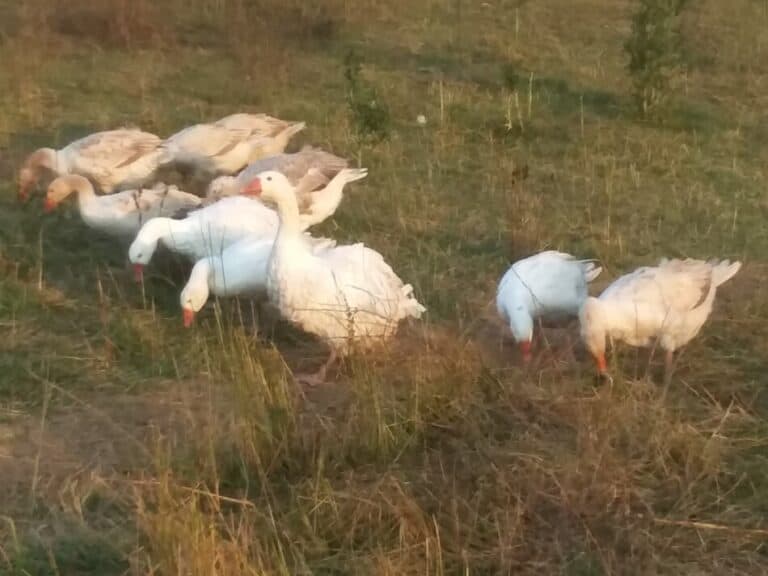Will A Goose Sit On Bad Eggs?
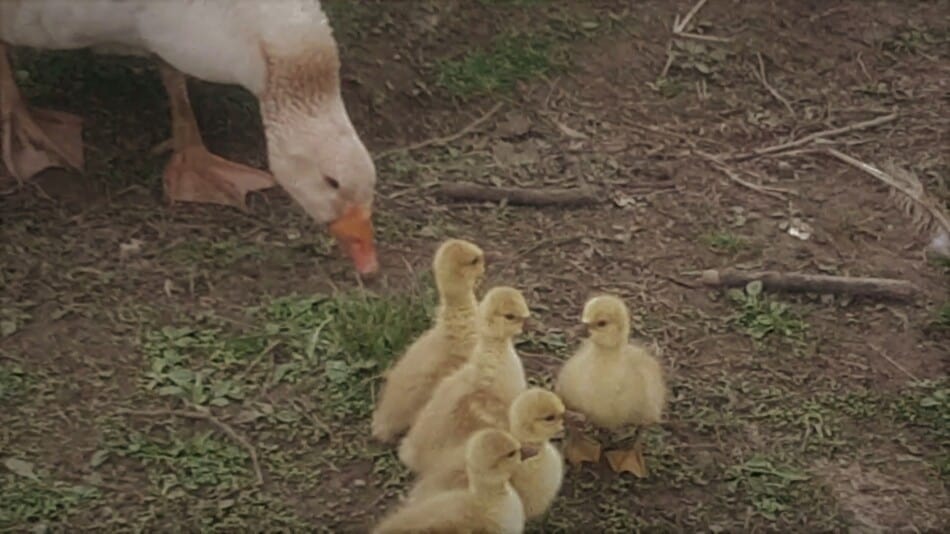
If your geese are (hopefully!) going to be hatching their own goslings this year, you are likely to have some questions about the eggs and what happens to bad eggs.
Where do bad eggs come from, what will your goose do about bad eggs and what should you do?
A goose can sit on bad (unhatchable) eggs, due to freezing weather and natural infertility of some eggs.
Sadly, once goose eggs are “bad” there’s nothing you can do to fix them. This is all about preventative measures and making sure that any mistakes from last time don’t come back to get you, and your geese, the following year.
How Much Space Do You Need To Raise Geese? is an article I wrote that you may want to read if you are thinking about raising your own goslings.
Fertility of goose eggs is 90%
90% of goose eggs are fertile, assuming of course that you have the correct gander to goose ratio and you have them all together pre breeding season.
If you have the right male to female ratio, acceptable feed ration and you have them together for the needed pre breeding time (your pairs have been together since Christmas, right?), then you should be getting the 90% fertility.
This means that 10% of goose eggs, even under ideal circumstances, are not going to be fertile. Right here, your goose starts out with at least one unfertile egg if she has a clutch of 10.
The crazy news as far as goose egg incubation goes is that unless you are really on your game, you are not likely to achieve the 90% hatch, it’s more like a 40% hatch for eggs you put in your incubator!
Not all fertile goose eggs will hatch
Not all fertile eggs will hatch. It is a long way from a fertile egg being laid and all the right stuff happening at the right time for the gosling to hatch. When you think of it that way, reliably getting goslings from your pair is amazing!
Even eggs that look good and were laid in acceptable weather can and will have some infertile eggs, this is the 90% thing.
Best Geese For Eating gives you my top pick for the best table goose.
If you aren’t getting good results, consider your goose management
No one likes to hear it, but often problems with hatching are management related, that means the people are messing up the geese!
Now you know. If you are not getting the results that you are looking for, like nearly all of the eggs hatching, consider your management and see what you can improve.
If you find you and your geese are way off of the norm, are you missing something? Were you late getting the geese paired up? Did you have the correct male to female ratio? Did every goose have a nesting area of her own?
Additionally, be aware that some breeds are going to be better moms than others. If you are not seeing the results you want, ask around to see what other folks with your same breed of geese are getting, hatching wise.
Here’s an example from a pair of my geese comparing last year and this year
For instance, last spring I put my young Sebastopol pair together a month or so before nesting, yikes, that was way to late! I told myself, even though they are running with other geese, these two are functioning as a pair so it will be fine.
Nope, it wasn’t. The first nest likely had crossbred eggs in it (turns out it did!), so I took the eggs and hoped she would lay more. She didn’t. That was a mess, and it was my doing.
This year they have been separate since early January and will have purebred goslings. So far, only two have hatched and the other eggs are not looking likely.
While this doesn’t get me more goslings this year, it does help me evaluate the pair and if I want to continue with the breed. I’m not saying my management was perfect, but it was pretty good. Last year, no, this year, yes.
Plus, the fact that the pair is turning two instead of just being yearlings as they were last spring.
Are Geese Easy To Raise? goes over the main needs of geese so you can see if raising them will work well for you.
Circling back to the main point of this article, what will become of the eggs still in the Sebastopol nest? I’m giving them a few extra days. It would be a shame to mess, because I’m impatient.
When the pair leaves the nest to roam for the day I’ll know that she has given up on the remaining eggs. I’ll listen to the egg, you’ll hear movement if the gosling is alive. Otherwise, she’s done for the year.
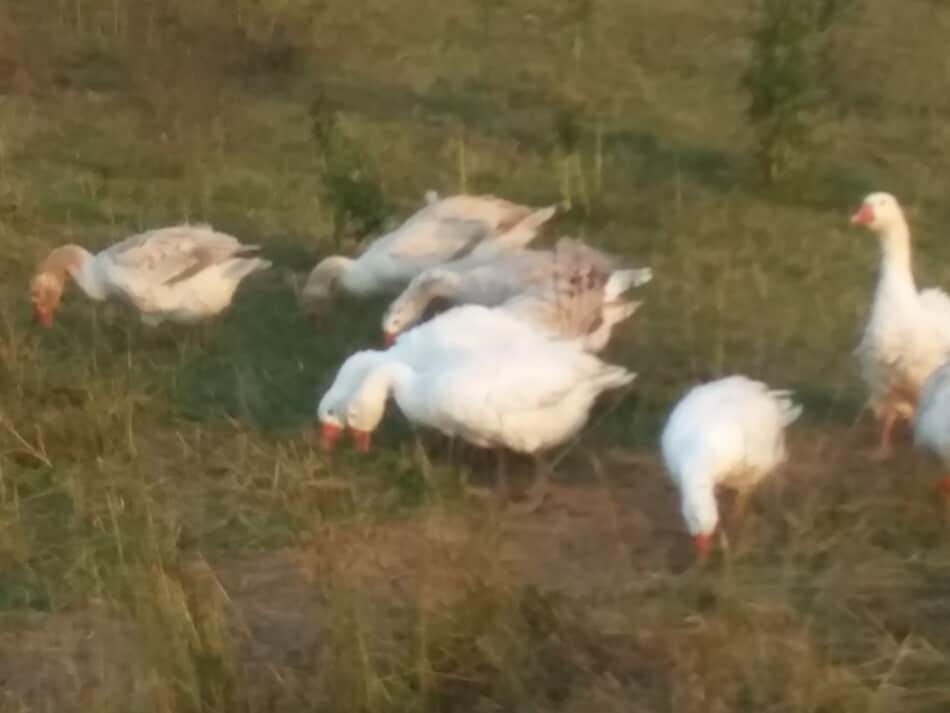
Eggs in nest froze before nesting began
If your goose laid her eggs in the nest and then those eggs in the nest froze, you will not get a hatch.
How could eggs in the goose’s nest freeze? Once she is setting on them, the eggs are kept nice and toasty, but while she is laying one egg per day to build the clutch, she still gets off of the nest and eats and drinks like normal.
If the cold snap comes when she is not finished building the nest, she will not be on the nest to keep it warm.
What do you do about it? We gather up the eggs before a really cold night and put them in the house, then take them back outside the next day or whenever the cold weather is past.
If you don’t want to gather the eggs, you could make sure she has plenty of bedding, like straw, to make a nice, insulated nest for the eggs. So, you’re counting on her to engineer the nest to be frost proof. This is a maybe.
If you think your goose is on a nest that froze out, you’ll need to look at the eggs closely. This means getting past her.
If she is close to the hatching date, even a few days over, give her time and don’t bother her.
Messing around with her now can make her upset enough to accidentally hurt any goslings that did hatch or leave the nest and not come back if you have the dates wrong.
If the nest is new and the eggs are unattended, check over the eggs. Any cracks? If so, they have to go. If the eggs look fine, put the nest back the way you found it and leave it alone.
If you find cracked eggs, and your goose is still laying, you can take the cracked eggs out and hope she continues to lay more to rebuild the clutch. This is a maybe. But if the eggs are cracked, you don’t have anything to lose by trying.
The geese seem to know when things are going wobbly and will kick out bad eggs or just abandon a ruined nest, altogether In our experience, the goose will not set forever, she’ll give up on the nest once she knows it’s not working.
She’s sitting on an egg from last year
As crazy as it sounds, one of the reasons for your goose to be sitting on a bad egg is that the bad egg is still around from last year. We have had this happen!
The geese seem to like the same few spots every year for nesting, which is good. Unless they pull up a “dead” egg from the previous nest when they are gathering bedding and end up with it in the new nest. Now there’s a problem.
When that rotten egg breaks open it will contaminate all of the other eggs in the nest, something they are unlikely to recover from.
Believe it or not, the growing gosling inside the shell gets air exchange from the outside through the egg shell, this is before the gosling can breathe itself.
This means that the shell is permeable, which is good for air exchange bad for when there is gunk on the outside of the egg’s shell. The same pores that allow the air exchange, also allow the contaminated gunk in.
I found a rotten egg, just the other day. (At the time of writing, the geese are setting.) It was out in the sheep field, so it had spent the entire winter outside (where, I don’t know) and still kept an good shell.
I know it wasn’t’ laid this spring because that egg was too far gone, once I cracked it. Super stinky. Sometimes the geese do lay an occasional egg out in the grass, so I though that was the case here, nope!
Completely clean out the goose nesting area every year
The fix to dealing with rotten eggs from last year is to completely clean out the nesting area when the geese are finished hatching for the spring.
You’ll have plenty of time between now and the next nesting season to get the nesting area cleaned out, but it’s best if you get right on it and clean it out now.
Completely clean out the nest area. Take out all of the straw, down to the floor, including all of the surrounding straw for a foot or two on the outside of the nest.
The straw beside the nest is where the rotten eggs that got kicked out of the nest will be “hiding”. These are the eggs that will mess up next year’s hatch for you. Don’t take the chance of those eggs sticking around!
Put the straw and any nest contents, like egg shells, in your compost pile. If the pile is dry, add some manure or water and give those bacteria time to work. This will turn a potential problem into a great addition to your yard or garden!
I know this sounds a bit paranoid, but completely cleaning out the nest and area surrounding the nest will keep you from being disappointed next year.
Since geese are so seasonal, it’s important to stack the deck in your favor from the start. A full clean out between nesting times will give you a great start on having a successful gosling hatch next year.
Maybe you’re thinking, “no way will those eggs get past my dogs that love to eat old eggs and everything else that’s out here trying to eat those eggs. too.”
That’s what I would think, as well, yet, we still find rotten goose eggs from the previous spring every year, despite the best efforts from egg eating wildlife and our dogs!
Clean out the nests, it’s worth your time.
Resources:
Egg Production, Incubation and Sex Identification Of Geese, NWS Department Of Primary Industries, this is where I got the 90% fertility and 40% hatching out of an incubator numbers
